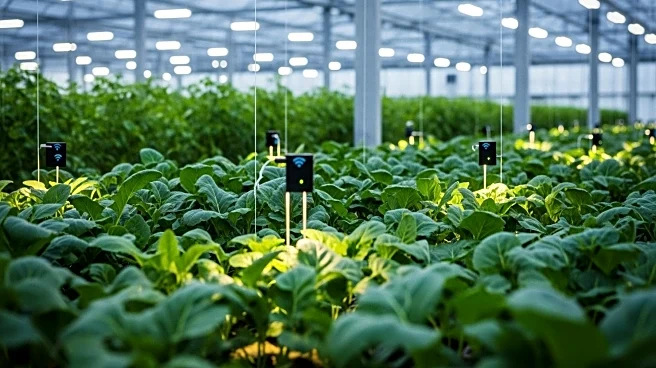What's Happening?
The smart farming market is anticipated to grow significantly, reaching USD 111.19 billion by 2033, according to a report by Straits Research. This growth is driven by the increasing adoption of Internet of Things (IoT), artificial intelligence (AI), and automation technologies in agriculture. These technologies are enhancing productivity, efficiency, and sustainability in the sector. In 2024, North America led the market with a 34.5% share due to early adoption of digital agricultural technologies and the presence of leading original equipment manufacturers (OEMs). Asia-Pacific is expected to be the fastest-growing region, fueled by rapid digital transformation in agriculture and government support for smart farming initiatives. The software segment dominated the market in 2024, followed by hardware systems and services, with precision agriculture leading the application segment.
Why It's Important?
The expansion of the smart farming market signifies a transformative shift in agriculture towards data-driven and sustainable practices. The integration of IoT and AI technologies allows for optimized resource use, real-time data analysis, and improved crop yields, which are crucial for meeting the growing global food demand. This shift also supports the production of organic and high-quality food products by reducing reliance on pesticides and fertilizers. However, the high cost of precision farming equipment poses a challenge, particularly for small and medium-scale farmers in developing economies. Despite this, the market presents lucrative opportunities for players offering AI-based precision farming solutions, which can enhance predictive analytics, pest detection, and weather forecasting.
What's Next?
The smart farming market is poised for continued growth, with North America maintaining its technological leadership due to strong infrastructure and government initiatives. Asia-Pacific is expected to witness rapid expansion, driven by increasing agricultural digitalization in countries like China, India, and Japan. The market will likely see further advancements in AI-powered systems, satellite imagery, and IoT devices, which will redefine modern farming practices. Stakeholders, including major companies like Deere & Company and AGCO Corporation, are expected to continue driving innovation and adoption of smart farming technologies.
Beyond the Headlines
The adoption of smart farming technologies raises ethical and cultural considerations, particularly regarding data privacy and the impact on traditional farming practices. As agriculture becomes more technology-driven, there may be shifts in labor dynamics, requiring new skills and training for farmers. Additionally, the focus on sustainable and organic food production aligns with global environmental goals, potentially influencing consumer preferences and market demand.










